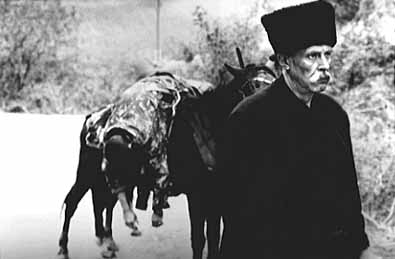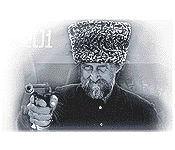 Organ of Alliance
Marxist-Leninist (North America) Volume 1, Issue 9; November-December 2003 $1.00
Organ of Alliance
Marxist-Leninist (North America) Volume 1, Issue 9; November-December 2003 $1.00 A L L I A N C E ! A Revolutionary Communist Monthly



VILLAGE DAGHESTAN THE 'NAIF' BODROV Jnr PATRIARCH Abdoul-Mourat (Djemal Sikharulidze)



THE PRISONERS - the naif & the Cynic The Father Shoots the Comprador Son Map
FILM REVIEW: Prisoner of the Mountains (Kavkazski Plennik);
A film by Sergei Bodrov Winner of the International Critics Prize Award and Audience Award at the Cannes Film Festival and Grand Prix, Karlovy Vary Festival, 2002.
This
is a spectacular film, one that all progressives will be moved by. It is
full of a deep humanity that speaks to ordinary people joining hands across
gulfs created by history. The film begins rather coldly as conscripts stripped
naked, are being passed for service in the Chechnya war by the cursory medical
examiners. As they follow naked down a corridor hiding their manhood, following
a nurse, one fresh-faced conscript asks “Where will we be sent?” Comes the
answer “Wherever there is war”. Where else in the post-Yeltsin Russian sub-continent
could that be, but Chechnya? Chechnya, where on the mountain tops, in a
small vignette - the village women still wrest a living out of the meager
grain sing: "The wind
frightens the heart of any strangers here ..."
When the film moves to that beautiful, war-torn land, we see the Russian
army at a rough and tumble play, in their secure base. But security is shallow.
When they next go on a patrol mission, it ends in a classic ambush by Chechen
guerillas, where two Russian survivors are taken as barely alive hostages.
One is a man-of-war veteran Sacha (Oleg Menshikov), whose world cynicism
is in stark contrast to the wide eyed naïf new conscript Vania (Sergei
Bodrov jnr) – his new prisoner-in-arms.
Bodrov cast his own son, as the naïf. This casting says the director,
Bodrov Snr, led to “the movie becoming more personal for me because
it was my son. He could easily have been in that war.” Both unconscious,
the hostages are transported by mule by an old grizzled patriarch Abdoul-Mourat (Djemal
Sikharulidze) to a mountain top
village (filmed in the mountain village of Rechi in Daghestan, bordering
Chechnya), where time might have stood still in the 1800’s. There they are
shackled and stuffed into a barn. To await what? Ali Murat plans to trade
the hostages. For the patriarch’s only son has been captured by the Russians
and is being held prisoner.
By now,
Tolstoy fans will recognise the origins of this film. In an interview
with “Filmaker” [At
http://www.filmmakermagazine.com/winter1997/endgame.html] the director explains: Bodrov:
“Prisoner of the Mountains” is a famous story in Russia, a classic. Every kid has to read it. In fact, it was written for kids and I knew the story when I was eight years old. In this story, the Chechens captured two Russian officers because they wanted to sell them for money. Ransom. Great story. But Tolstoy was a Russian officer, so he was pro-Russian. The Chechens were cruel "smelly Tartar people." And the Russians were right, and the Chechens were wrong. Tolstoy was a genius, so he could afford to make mistakes. I don't know who is right and who is wrong. I'm not a judge. I just feel sorry about people.”
But the audience
may disagree with Bodrov.
Firstly, that Tolstoy was racist to the Tartars
and Chechens (See below).
But, secondly that Bodrov himself makes no judgements.
For while Bodrov does not carry a propaganda sign, his film steadily intones
against Russian imperialist invaders, and many details make his judgment
apparent. From the pictures of the dispirited Russian army:
[A Clip: A soldier walks into a liquor store & purchases vodka with a pistol;
Clip: the Russian commander is attacked by the distraught mother of one of the hostages when he tells her that there is nothing he can do to obtain release of the hostage – as he says: “Mother, my soldiers trade grenades for hash, and then the Chechens throw the grenades back at us”;
Clip the same commander later is stuffing huge spoons of caviar and fruits into his greedy mouth while he acknowledges that it is a waste of time trying to suppress the Chechens;
Clip: The gruff but kindly Chechen guard of the Russians establishes a curious bond with the hostages, and is revealed to have had his tongue cut out by the Russians;
Clip: The cynical hostage weeps seeing the likely ending of the saga; etc].
Bodrov
does not wish to make an explicit political statement. He says his film
has a simple and common message:
“Normally in war you have one rule: You have to kill your enemy. Unfortunately it's easier to kill a man than to like him. But somebody has to change this rule. So, I wanted to make this strong and simple message.” [Film-maker Interview with Bodrov; Ibid]; “Everyone thinks I'm making a film about that war. It's not true. Besides, it's a universal story. You could make this film in Bosnia, Afghanistan, Mexico, almost anywhere.
“We used Tolstoy's thoughts about war and peace. Life is short, the world is small. Why are people still fighting each other after thousands of years?''
And Bodrov
does gets this ‘peace’ message across. Because he shows the melting of the
hostile relationship between both the hostages to each other, and even more
touchingly, the warming of the captors to their charges. This is most vivid
in the delicacy that he shows the relationship between the young girl Dina (Susanna Mekhralieva) - a
twelve year old who says: “I shall get married next year. Here we tend to
do this things early”) and the naïf hostage. The gruff guard also becomes
fond of them, before he is killed in a desperate attempt at freedom. This
also leads to the death of the cynical hostage leaving the naïf by
himself. Even the patriarch yields, as the film’s dramatic end will show,
while in an earlier vignette, he awkwardly gives an indirect unspoken thanks
to the hostage for repairing his watch.
The stark circumstances
and setting is leavened by the physical beauty of the Caucasus, and the charm
of the human interactions. One aspect of the humanity is its humour. In a
memorable scene the, two hostages try to break through a wall in order to
escape, and merely find a cache of home-made liquor. Naturally they get drunk.
Sobering up on a rooftop overlooking the village, the two hostages start
to dance awkwardly but impressively, in their shackled chains. Dancing must
be in the soul of the Russians – or at least of Bodrov, as there is another
scene of dancing in chains, this time rather hilariously to Sachmo heard
on a radio that they repair.
But the growing
bonds between the humans at the bottom of the food chain, cannot counter
the reality of imperial invasion. It is the naif’s mother, a school teacher,
who forces a deal with the Patriarch. On the eve of the deal, another Chechen
father renders accounts to his son, who has turned coat and enlisted with
the Russian army. Shooting him dramatically in the base camp, the prisoners
try to flee in the mayhem. Our patriarch’s son is shot. The Russian mother
wails as she understands that her son is dead also. And the patriarch collecting
his own son’s body, returns home determined to exact the price. Knowing this, his daughter frees the hostage, but the naïf,
refuses to run away, fearing the repercussions on Dina.
As the patriarch
leads the son away form the village, his rifle in hand, we think we know
the ending. But safely out of sight of the village, the patriarch fires
into the sky – the hostage is left alive to walk to the close-by Russian
lines, and the Patriarch’s honour is saved. As the naïf walks to the
lines, he thinks the Russian helicopter gun ships slashing the airs are
searching for him. As they fly over him, destined for the village he has
just come from, he realises with horror and rage that they are after all
helicopter gun-ships and will try to destroy that village. The narrated end,
reveals that he survives and back in White Russia, yearns for the people
he came to love and will never meet again.
See this film.
TOLSTOY AND THE EASTERN RUSSIAN EMPIRE
It is said in one of the interviews that Sergei Bodrov gave, that Tolstoy
shared the Russian imperial views of the Chechens and the Cossacks. But this
does not come out in a reading of Tolstoy. Obviously Tolstoy’s philosophy
was very far from a Marxist-Leninist view. However, his humanity and regard
for the peoples of the Caucasus comes through. Yes, it is expressed in a
thoroughly partial manner, and has spiritual overtones implying redemption
by unfathomable means. But naïve though he was, Tolstoy undoubtedly
believed that human qualities such as truth, courage, honesty and generosity,
were primary. Tolstoy certainly did not cherish the truths of money and prestige.
Of the stories he wrote regarding the peoples of the Eastern parts of the
Russian Empire, all glow with his admiration of them. These stories are “The
Cossacks” 1852; “A Prisoner in the Caucasus” 1870, and “Hadji Murat” 1904.
Of these the later ones are probably the better ones, with less of a cloying
sentimentality.
In fact Tolstoy himself wrote later in his life in “What is Art?” – that of his work, “A Prisoner in the Caucasus” was one of the few works he had written, that he thought qualified as art. Two excerpts are given below.:
A PRISONER IN THE CAUCASUS
EXCERPT ONE
"Zhílin asked the master who the old man was.
'He is a great man!' said the master. 'He was the bravest of our fellows; he killed many Russians and was at one time very rich. He had three wives and eight sons, and they all lived in one village. Then the Russians came and destroyed the village, and killed seven of his sons. Only one son was left, and he gave himself up to the Russians. The old man also went and gave himself up, and lived among the Russians for three months. At the end of that time he found his son, killed him with his own hands, and then escaped. After that he left off fighting, and went to Mecca to pray to God; that is why he wears a turban. One who has been to Mecca is called "Hadji," and wears a turban. He does not like you fellows. He tells me to kill you. But I can't kill you. I have paid money for you and, besides, I have grown fond of you, Iván. Far from killing you, I would not even let you go if I had not promised.' And he laughed, saying in Russian, 'You, Iván, good; I, Abdul, good!'"
EXCERPT TWO
“ Suddenly he heard a rustling overhead, and saw Dina crouching at the edge of the pit, her knees higher than her head, and bending over so that the coins of her plait dangled above the pit. Her eyes gleamed like stars. She drew two cheeses out of her sleeve and threw them to him. Zhílin took them and said, 'Why did you not come before? I have made some toys for you. Here, catch!' And he began throwing the toys up, one by one.
But she shook her head and would not look at them.
'I don't want any,' she said. She sat silent for awhile, and then went on, 'Iván, they want to kill you!' And she pointed to her own throat.
'Who wants to kill me?'
'Father; the old men say he must. But I am sorry for you!'
Zhílin answered: 'Well, if you are sorry for me, bring me a long pole.'
She shook her head, as much as to say, 'I can't!'
He clasped his hands and prayed her: 'Dina, please do! Dear Dina, I beg of you!'
'I can't!' she said, 'they would see me bringing it. They're all at home.' And she went away.
So when evening came Zhílin still sat looking up now and then, and wondering what would happen. The stars were there, but the moon had not yet risen. The Mullah's voice was heard; then all was silent. Zhílin was beginning to doze, thinking: 'The girl will be afraid to do it!'
Suddenly he felt clay falling on his head. He looked up, and saw a long pole poking into the opposite wall of the pit. It kept poking about for a time, and then it came down, sliding into the pit. Zhílin was glad indeed. He took hold of it and lowered it. It was a strong pole, one that he had seen before on the roof of his master's hut. He looked up. The stars were shining high in the sky, and just above the pit Dina's eyes gleamed in the dark like a cat's. She stooped with her face close to the edge of the pit, and whispered, 'Iván! Iván!' waving her hand in front of her face to show that he should speak low.
'What?' said Zhílin.
'All but two have gone away.'
…. Zhílin seized the pole, told Dina to hold on, and began to climb. He slipped once or twice; the shackles hindered him. … he managed to get to the top. Dina with her little hands, pulled with all her might at his shirt, laughing.
Zhílin drew out the pole and said, 'Put it back in its place, Dina, or they'll notice, and you will be beaten.'
She dragged the pole away, ….
'Good-bye, Dina dear!' he said. 'I shall never forget you!'
Dina seized hold of him and felt about with her hands for a place to put some cheeses she had brought. He took them from her.
'Thank you, my little one. Who will make dolls for you when I am gone?' And he stroked her head.
Dina burst into tears hiding her face in her hands. Then she ran up the hill like a young goat, the coins in her plait clinking against her back.”
(Written in 1870.)
See in this issue Lenin on Tolstoy at: http://harikumar.brinkster.net/PAPER/NOVEMBERDECEMBER2003/Tolstoy.htm
Related Materials: Alliance on the Chechnyan war of liberation & Oil & the New Russian capitalist classes at: http://www.allianceML.com/AllianceIssues/ALL13-CHECHNYA95.HTM